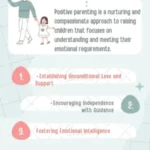Parenting is a journey packed with countless obstacles, and one of the most crucial obligations parents have is disciplining their children. Effective discipline not only molds a child’s conduct but also provides the groundwork for them to become self-disciplined and well-adjusted persons in the future. In this thorough book, we will study the fundamentals of effective and constructive punishment, suited to a child’s age, development, and temperament.
The Purpose of Discipline
Discipline acts as a directing factor in a child’s life, with many fundamental objectives:
- Protection from Danger: It saves youngsters from danger by teaching them limits and appropriate conduct.
- Self-Control and Self-Discipline: Discipline helps youngsters to develop self-control and self-discipline, vital abilities for managing life’s problems.
- Responsibility: It instills a feeling of responsibility, helping youngsters grasp the repercussions of their actions.
Respect and Trust: The Cornerstones of Discipline
Children should accept their parent’s authority, yet punishment should never be harsh or unjust. Shouting or insulting a youngster erodes their trust and respect for their parents. Effective discipline is built on mutual respect and understanding.
Read also: Child Behavioral Problems And Solutions
Consistency is Key
Consistency in discipline is crucial, regardless of a child’s age. Inconsistency produces uncertainty and irritation for children, making it harder for them to respect and trust their parents. Parents must create clear and consistent limits.
The Principle of Fairness
Discipline must be fair, with consequences that fit with the child’s conduct. Overly severe or unduly mild sanctions are detrimental. The punishments should be appropriate to the wrongdoing, teaching youngsters the value of responsibility.
Empowering Through Choices
Encouraging good conduct requires providing children options when appropriate. Allowing students to make choices within bounds creates a feeling of autonomy and responsibility. Parents should emphasize regulations that protect the safety, health, and well-being of their kid.
Understanding Circumstances
It’s vital to remember that children’s conduct may be impacted by their environment. If a youngster is angry, fatigued, or disturbed, parents should give empathy and support rather than punishing actions. Sometimes, bad conduct is a response to external stimuli.
Fostering Positive Behavior
Promoting good conduct in youngsters demands a proactive approach:
- Quality Time: Spend quality time alone with your kid every day. This one-on-one time builds your relationship and encourages great conduct.
- Physical love: Express love with embraces, cuddles, or soft pats on the back. Physical affection is an effective approach to promote excellent conduct.
- Appreciation and Encouragement: Recognize and appreciate your child’s accomplishments and excellent conduct. Positive reinforcement motivates people to continue making positive choices.
- Understanding Emotions: If your kid is experiencing anger or grief, take the time to understand their emotions and speak through them. Teaching emotional intelligence is a crucial part of discipline.
- Leading by Example: Children learn by watching their parents. Set a good example by acting responsibly and displaying proper behavior.
Conclusion
Effective discipline is a crucial component of parenting, influencing a child’s character and destiny. By establishing mutual respect, consistency, fairness, and empathy, parents may steer their children towards being responsible, self-disciplined, and well-adjusted persons.
Remember, discipline is a tool for nurturing, not punishment. It fosters trust, establishes friendships, and enables children to make great choices in life.





